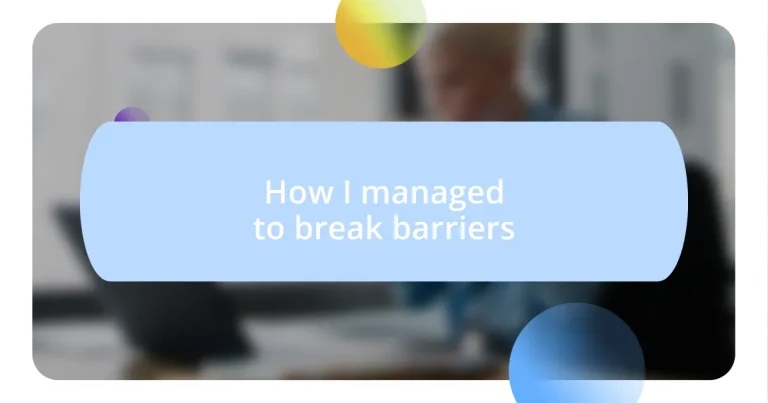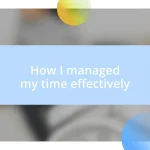Key takeaways:
- Identifying personal barriers involves honest self-reflection and confronting limiting beliefs shaped by past experiences.
- Understanding fear of failure can transform it into a learning opportunity, allowing individuals to pursue more challenges.
- Setting achievable goals and celebrating small victories fosters motivation and builds confidence, creating a supportive progress-oriented mindset.
- Building a diverse support network and embracing continuous learning enhances resilience and provides different perspectives on challenges.
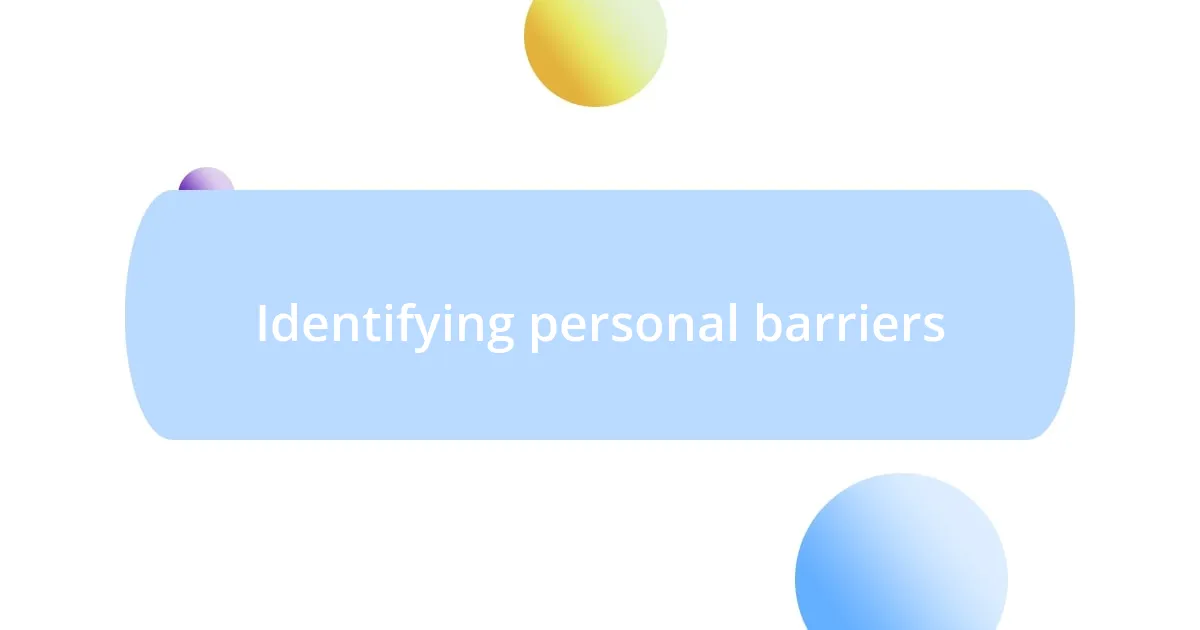
Identifying personal barriers
Identifying personal barriers starts with honest self-reflection. I vividly remember sitting in a quiet café, grappling with feelings of inadequacy before an important presentation. Was it my fear of judgment, or did I just lack confidence in my abilities? This moment was pivotal; it pushed me to confront the doubts that were holding me back.
As I navigated these thoughts, I began to see that my biggest barrier was often rooted in past experiences. For instance, I had always shied away from leadership roles because I’d been told I was “too quiet” in meetings. Recognizing how deeply those words had affected me helped me understand that I had internalized limitations that weren’t necessarily true. Have you ever found yourself second-guessing your potential because of someone else’s opinion?
After this realization, it was clear: facing my barriers required willingness and vulnerability. One day, I decided to take a small step—volunteering to lead a team project. The mix of excitement and fear was overwhelming, but it became a gateway to rediscovery. Sometimes, it’s those little moments that highlight the walls we’ve built around ourselves, just waiting to be broken down.
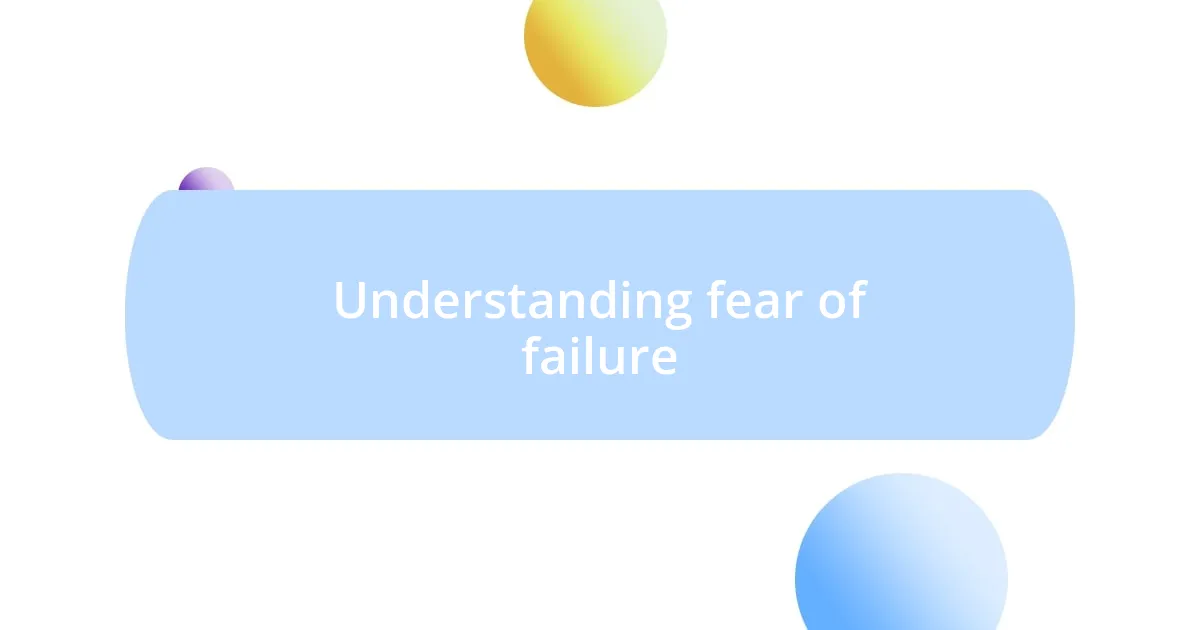
Understanding fear of failure
Understanding fear of failure can be a complex and deeply personal journey. I recall a time when I hesitated to apply for a challenging job, convinced that I would never meet the expectations. The anxiety of possibly falling short loomed large, but looking back, I realize that my fear was more about the unknown rather than my actual abilities. It’s amazing how those feelings can distort our vision, making obstacles seem larger than life.
- Fear of failure often stems from a desire for perfection, which can lead to paralysis instead of progress.
- Many people internalize past disappointments, translating them into a belief that they aren’t capable.
- Social comparisons can exacerbate this fear, leaving us feeling inferior when we see others succeed.
- Taking small risks can be a powerful antidote; each success builds confidence and starts to erode that fear.
- Ultimately, understanding that failure is a part of growth can help reframes our relationship with it.
When I decided to push through my apprehension and take the plunge, something shifted within me. I began to see failures not as a reflection of my worth, but as invaluable lessons that enriched my experiences. This shift has been transformative; it has allowed me to pursue opportunities I once would have turned down, making my journey much more fulfilling.
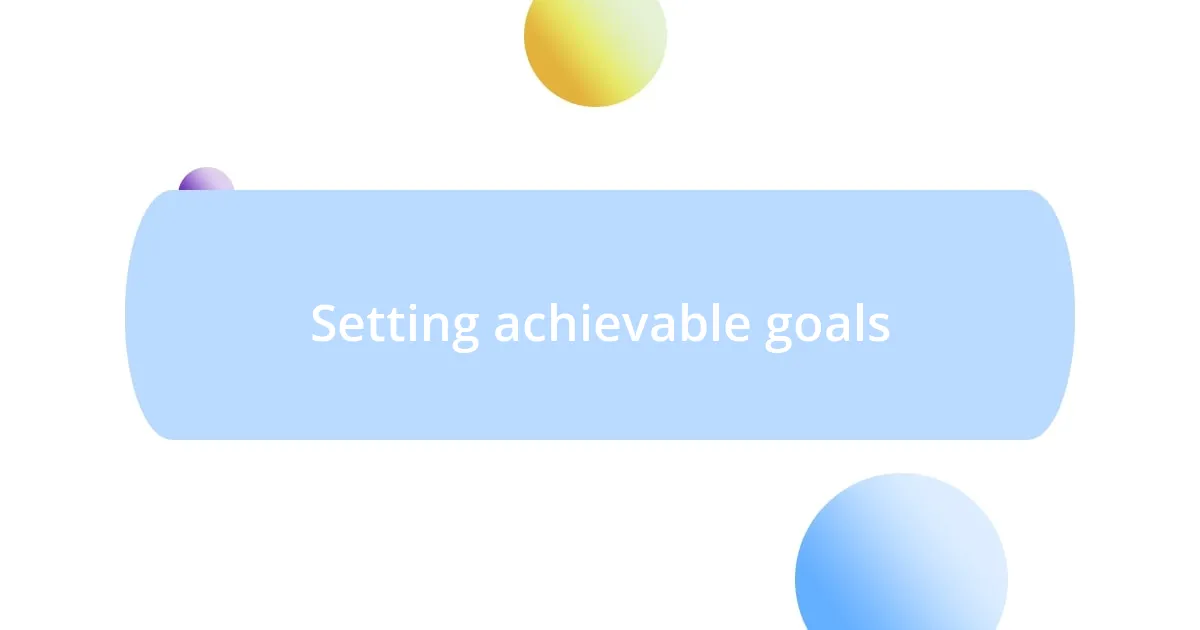
Setting achievable goals
Setting achievable goals can be a game-changer in breaking barriers. When I first started setting goals, I thought grand ambitions were the way to go. However, after several overwhelming experiences, I learned that focusing on smaller, manageable objectives paved the way for success. For example, instead of saying, “I want to be a public speaker,” I’d break this down into specifics: “I’ll speak for five minutes at the next team meeting.” This way, I could build confidence gradually.
Another insight I’ve had is about the importance of measuring milestones along the way. I remember tracking my progress on a personal project. Each time I ticked off an item on my checklist, I felt a rush of accomplishment. This not only fueled my motivation but also kept my mind engaged and focused. Have you ever noticed how those small wins can significantly boost your momentum? It’s all about appreciating every step you take in the journey.
Finally, I learned that sharing my goals with others creates a sense of accountability. When I told a friend about my aspiration to develop a new skill, they offered to join me and practice together. This partnership provided both motivation and support, making the process far more enjoyable. By setting achievable goals, I discovered that I could create a roadmap tailored to my pace, ensuring I wouldn’t feel overwhelmed but rather empowered to continue pushing my boundaries.
| Goal Type | Focus |
|---|---|
| Grand Ambitions | Overwhelming |
| Small, Manageable Objectives | Empowering |
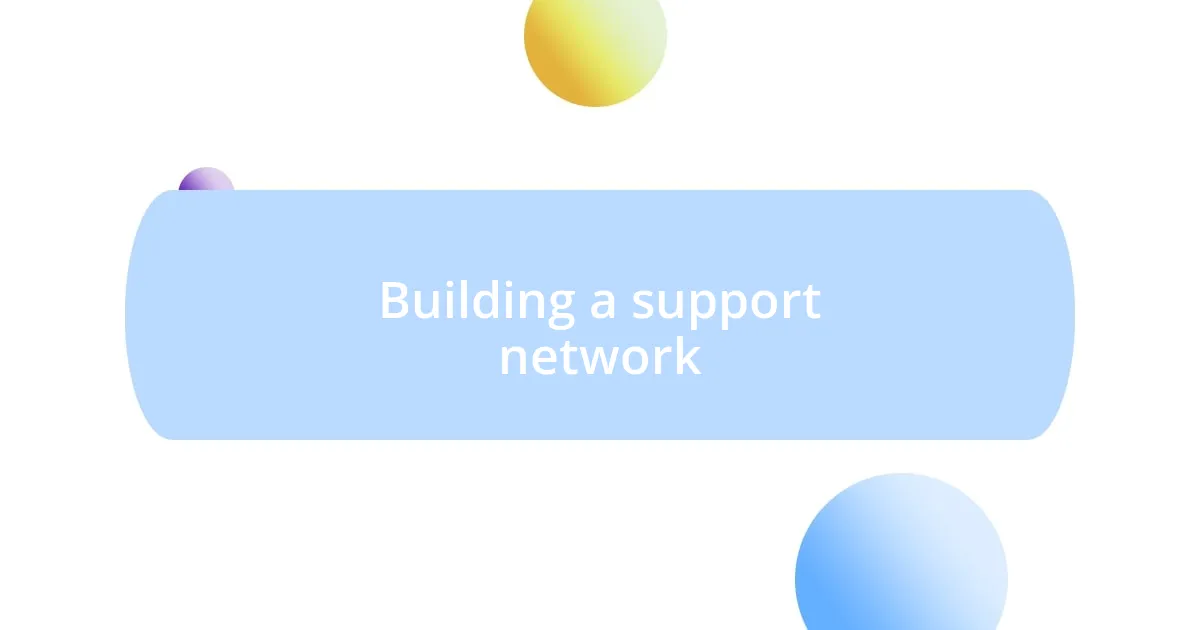
Building a support network
Building a strong support network has been one of the most crucial moves in my journey to break barriers. When I was hesitant to pursue a challenging opportunity, I reached out to friends who had faced similar situations. Their encouragement made a significant difference, reminding me that I wasn’t alone. We often overlook the power of surrounding ourselves with people who genuinely uplift us. Have you ever thought about who in your life inspires you to push forward?
Connecting with mentors has also been vital in shaping my perspective. I vividly remember a conversation with a mentor who shared her setbacks and triumphs in her career. Her openness made me realize that everyone faces obstacles, and it’s how we navigate them that defines us. Those candid discussions are invaluable; they helped me see my challenges in a new light and motivated me to keep pushing my limits.
Moreover, I learned the importance of diversifying my support system. Not all advice fits every situation, and having different perspectives has enriched my understanding. A close friend offered a fresh angle that I hadn’t considered, sparking a breakthrough for me. It’s fascinating how different viewpoints can shine light on solutions we didn’t see before. Have you tried seeking different opinions on your challenges? It might be just what you need to break through your own barriers.
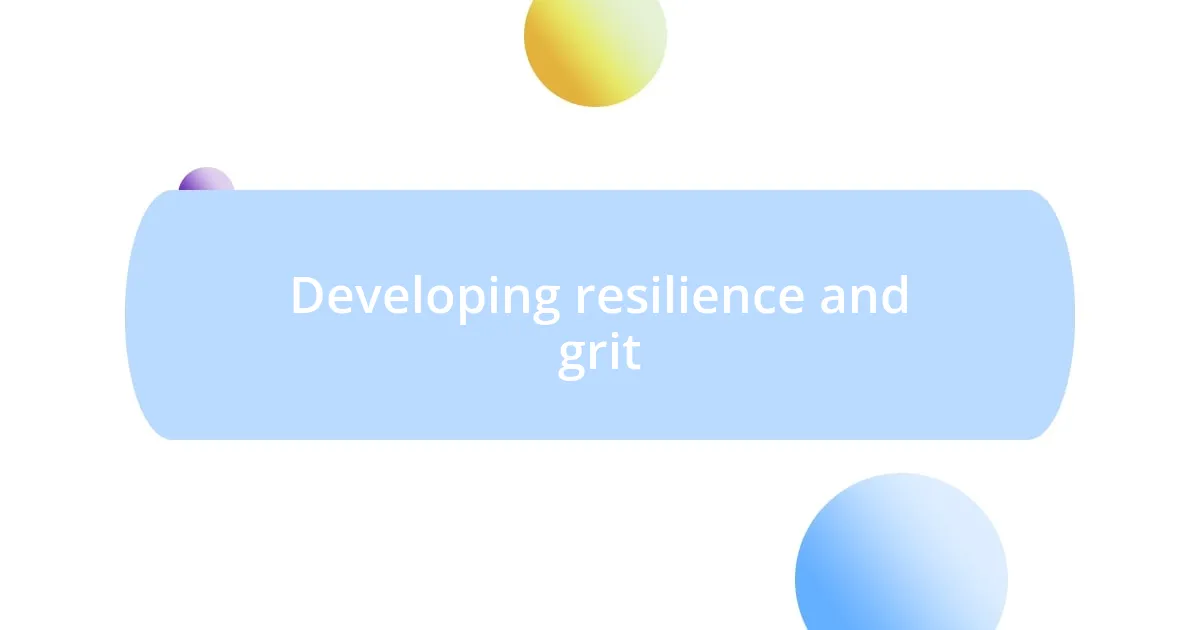
Developing resilience and grit
Developing resilience and grit has been a transformative aspect of my journey. I recall a time when I faced a project deadline that felt insurmountable. Instead of succumbing to panic, I embraced a mindset shift; I broke the work down into smaller tasks and began tackling one piece at a time. This approach not only made the challenge feel manageable, but it also instilled a sense of pride as I crossed each item off my list. Have you ever found that taking small steps can lead to significant progress?
Embracing failure as a learning opportunity has been another pivotal moment for me. I remember a situation where I didn’t get the job I really wanted. Initially, it stung, but reflecting on that experience allowed me to identify areas for improvement. I started to view setbacks as stepping stones rather than setbacks. It’s remarkable how shifting your perspective can ignite your resilience and fuel your determination. Have you ever turned a failure into a crucial lesson? It’s an empowering discovery.
Consistency has emerged as a vital component in cultivating grit. Over the years, I committed to small daily practices, like reading for just a few minutes or dedicating time to mindfulness. These practices, although tiny, have reinforced my ability to persist, especially during challenging times. I’ve come to appreciate that resilience isn’t just about bouncing back; it’s about continuously pushing through, even when the going gets tough. What small habits have you cultivated that might fortify your resilience?
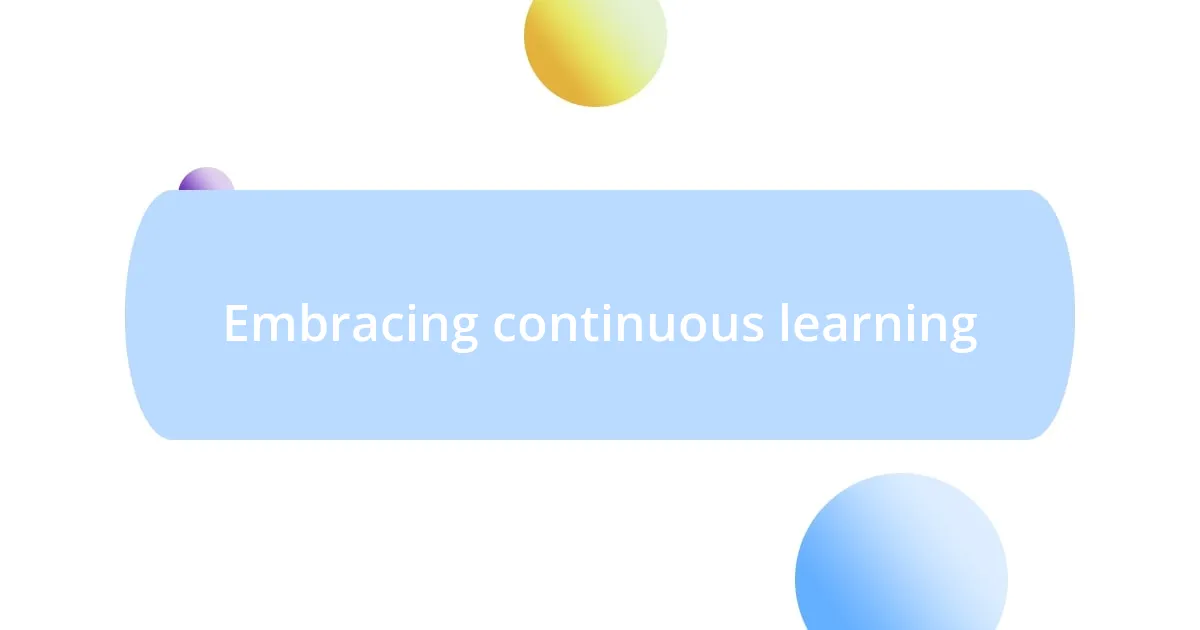
Embracing continuous learning
Embracing continuous learning has truly reshaped my approach to challenges. I remember attending a workshop focused on new industry trends. The excitement in the room was contagious, and it reminded me how vital it is to stay curious. Have you ever experienced that “aha!” moment when a fresh idea suddenly clicks? Those moments reaffirm why I prioritize continuous learning; they fuel my passion and motivate me to seek out new experiences.
In another instance, I decided to enroll in an online course about leadership skills. Initially, I felt intimidated—I worried it might be too advanced. However, stepping into that space helped me realize that learning is a journey, not a destination. I learned just as much from my peers as I did from the instructors. It’s fascinating how every shared insight can open new pathways. Have you ever hesitated to pursue something new because of self-doubt? Taking that leap taught me that discomfort often precedes growth.
Lastly, I’ve found that sharing what I learn with others enhances my understanding. When I began mentoring a group of interns, I discovered that teaching reinforces my own knowledge. Their inquiries often prompted deeper reflections on the material. It’s rewarding to see how our conversations not only benefit them but also enrich my own learning experience. Every interaction feels like a collaborative journey into the unknown. Have you considered how sharing knowledge could illuminate your own path?
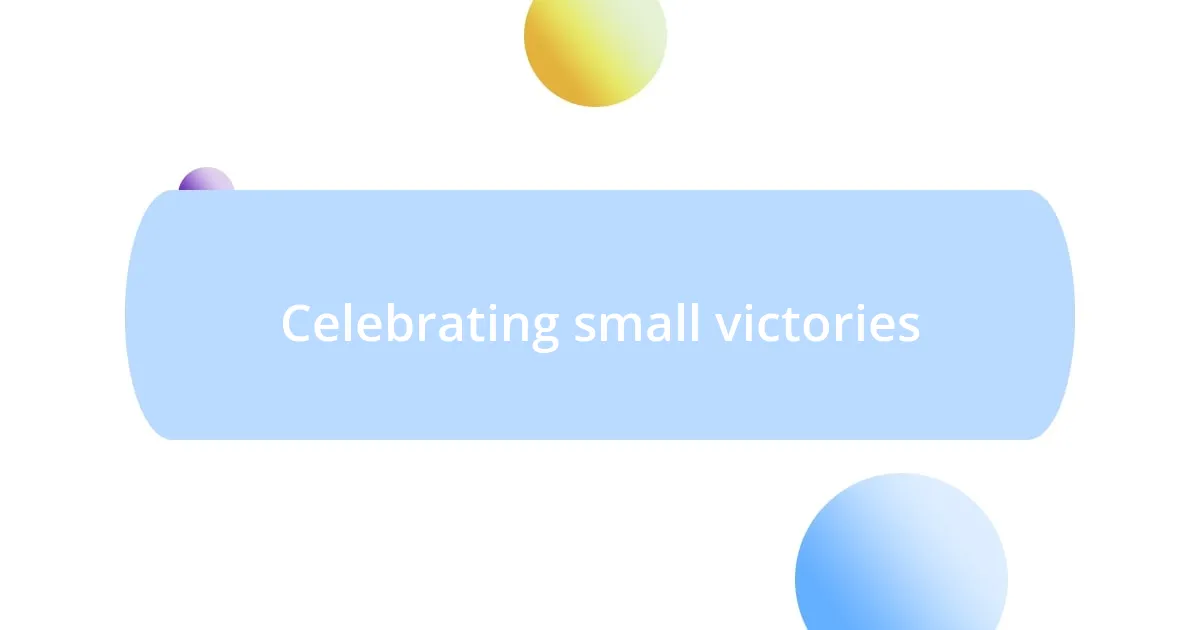
Celebrating small victories
Celebrating small victories has become a vital part of my routine. I remember one day, after finishing a difficult report, I allowed myself a moment of joy. I treated myself to my favorite coffee shop—a little indulgence that felt like a huge reward. Have you ever found that giving yourself permission to celebrate minor accomplishments can shift your entire mood?
There’s something truly uplifting about acknowledging the little wins. Just the other week, I completed a task that had been on my to-do list for far too long. Instead of brushing it off, I took a moment to savor that productivity. I celebrated with a brief walk outside, feeling the fresh air reinvigorate me. Those short pauses allow me to reflect on progress rather than just the outcome. How do you recognize and appreciate your small achievements throughout the day?
I’ve learned that compiling a ‘victory list’ also helps me keep track of my progress. Whenever I finish a project, I jot down a few highlights—what went well and what I learned. It’s a simple practice, but reading through those moments often fills me with gratitude and motivation. Doesn’t it feel good to see how far you’ve come, even in the smallest ways? This ongoing recognition of my efforts keeps me inspired to push beyond those barriers.












